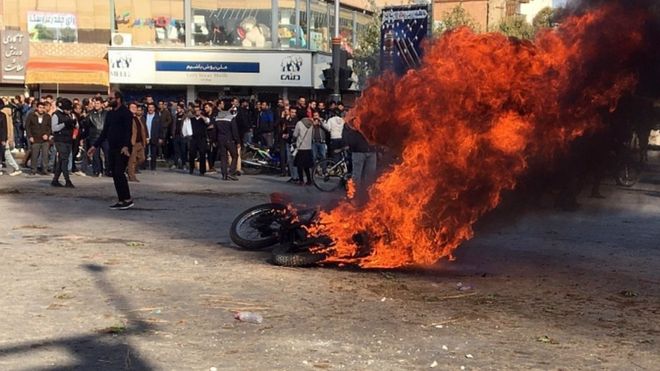Iran petrol price hike: Supreme Leader condemns 'hooligan' protesters
Sun 17 Nov 2019, 18:26:58

The Ayatollah blamed "hooligans" and counter-revolutionaries for violence that has been witnessed in several cities.
At least one person is confirmed dead in clashes with police but reports suggest the number could be higher.
Officials have warned of a tougher response if "illegal" actions continue.
Protests erupted on Friday after the government unexpectedly announced it was rationing petrol and removing subsidies - sending prices up by 50%.
The measures are the latest sign of pressure on the Iranian economy after the re-imposition of US sanctions. The government says the changes will free up money to help the poor.
What's the official reaction?
In a statement on Sunday, Ayatollah Khamenei acknowledged that some people were "no doubt worried" by the decision to increase fuel prices.
"But sabotage and arson is done by hooligans not our people," he said.
"The counter-revolution and Iran's enemies have always supported sabotage and breaches of security and continue to do so."
Following his comments a group of MPs withdrew a motion aimed at reversing the fuel-price increase, Iranian media reported.
Iran's state-run TV has accused "hostile media" of trying to exaggerate the scale of the unrest. Footage of protests has been widely distributed on social media.
What's the situation on the ground?
Internet monitoring service Netblocks said late on Saturday that Iran was experiencing a near-total national internet shutdown .
The move was condemned by US State Department spokeswoman Morgan Ortagus who tweeted: "We condemn the attempted shutdown of the internet. Let them
speak!"
speak!"
Prosecutors quoted by the semi-official Isna news agency on Sunday said 40 people were arrested in the central city of Yazd, most of whom were not local residents.
Some shops in Tehran's bazaar were shut on Sunday following "disruption" caused by people outside, Isna added without elaborating.
Some of the worst unrest has been reported in the central city of Sirjan where at least one person was killed during protests on Friday.
Demonstrations were reported on Saturday in the cities of Doroud, Garmsar, Gorgan, Ilam, Karaj, Khoramabad, Mehdishahr, Qazvin, Qom, Sanandaj, Shahroud and Shiraz, state media reported.
What's the background?
Under the new fuel measures, each motorist is allowed to buy 60 litres (13 gallons) of petrol a month at 15,000 rials ($0.13; £0.10) a litre . Each additional litre then costs 30,000 rials.
Previously, drivers were allowed up to 250 litres at 10,000 rials per litre , AP reports.
US sanctions were re-imposed last year after President Donald Trump abandoned the landmark nuclear deal between Iran and six world powers.
The sanctions have led to a sharp downturn in Iran's economy, pushing the value of its currency to record lows, quadrupling its annual inflation rate, driving away foreign investors and triggering protests.
No Comments For This Post, Be first to write a Comment.
Most viewed from International
Most viewed from World
AIMIM News
Latest Urdu News
Most Viewed
May 26, 2020
Do you think Canada-India relations will improve under New PM Mark Carney?
Latest Videos View All
Like Us
Home
About Us
Advertise With Us
All Polls
Epaper Archives
Privacy Policy
Contact Us
Download Etemaad App
© 2025 Etemaad Daily News, All Rights Reserved.

.jpg)
.jpg)
.jpg)






.jpg)


.jpg)
.jpg)
.jpg)
.jpg)
.jpg)
.jpg)
.jpg)
.jpg)
.jpg)
.jpg)
.jpg)
.jpg)

















